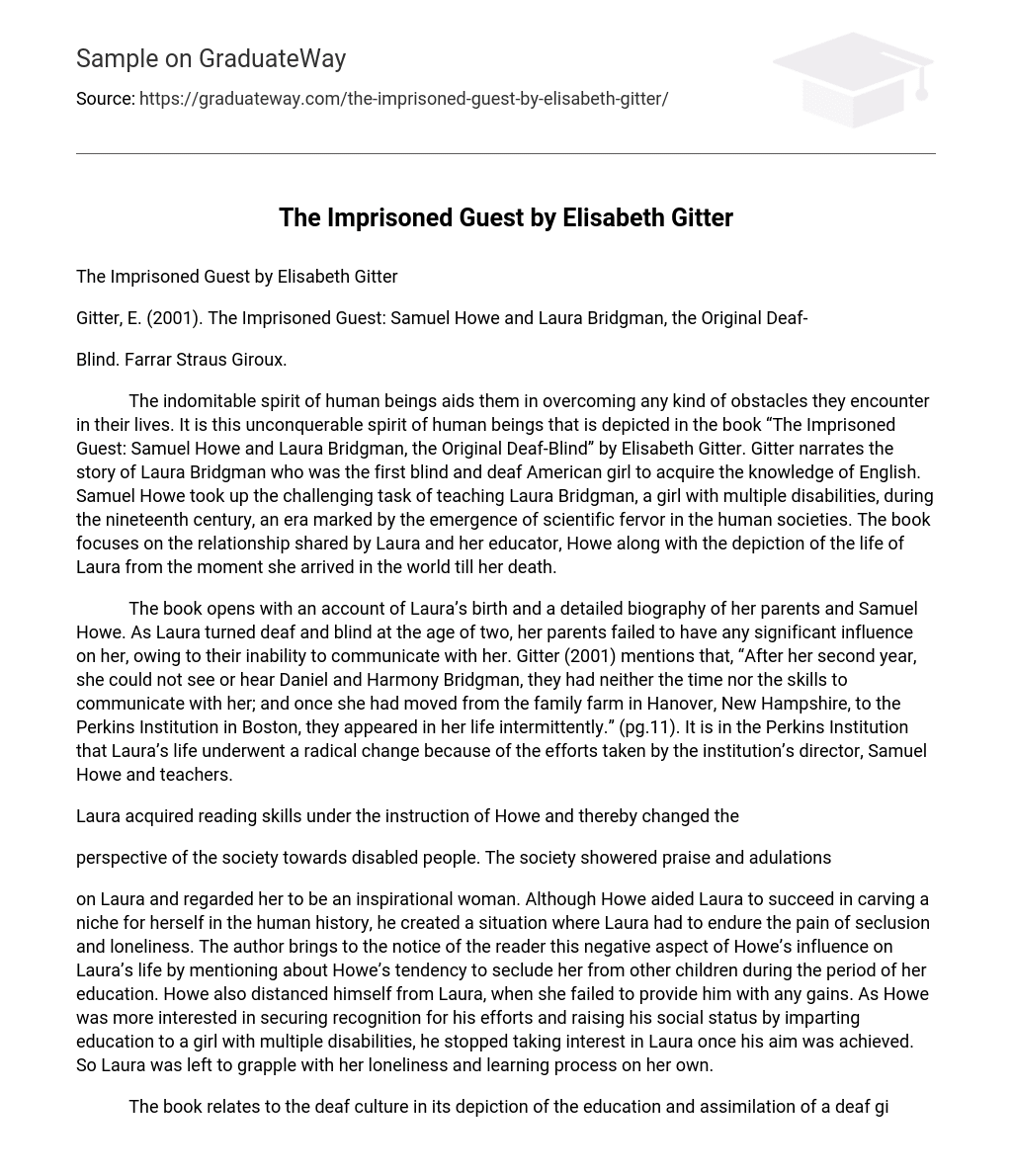Gitter, E. (2001). The Imprisoned Guest: Samuel Howe and Laura Bridgman, the Original Deaf-
Blind. Farrar Straus Giroux.
The indomitable spirit of human beings aids them in overcoming any kind of obstacles they encounter in their lives. It is this unconquerable spirit of human beings that is depicted in the book “The Imprisoned Guest: Samuel Howe and Laura Bridgman, the Original Deaf-Blind” by Elisabeth Gitter. Gitter narrates the story of Laura Bridgman who was the first blind and deaf American girl to acquire the knowledge of English. Samuel Howe took up the challenging task of teaching Laura Bridgman, a girl with multiple disabilities, during the nineteenth century, an era marked by the emergence of scientific fervor in the human societies. The book focuses on the relationship shared by Laura and her educator, Howe along with the depiction of the life of Laura from the moment she arrived in the world till her death.
The book opens with an account of Laura’s birth and a detailed biography of her parents and Samuel Howe. As Laura turned deaf and blind at the age of two, her parents failed to have any significant influence on her, owing to their inability to communicate with her. Gitter (2001) mentions that, “After her second year, she could not see or hear Daniel and Harmony Bridgman, they had neither the time nor the skills to communicate with her; and once she had moved from the family farm in Hanover, New Hampshire, to the Perkins Institution in Boston, they appeared in her life intermittently.” (pg.11). It is in the Perkins Institution that Laura’s life underwent a radical change because of the efforts taken by the institution’s director, Samuel Howe and teachers.
Laura acquired reading skills under the instruction of Howe and thereby changed the
perspective of the society towards disabled people. The society showered praise and adulations
on Laura and regarded her to be an inspirational woman. Although Howe aided Laura to succeed in carving a niche for herself in the human history, he created a situation where Laura had to endure the pain of seclusion and loneliness. The author brings to the notice of the reader this negative aspect of Howe’s influence on Laura’s life by mentioning about Howe’s tendency to seclude her from other children during the period of her education. Howe also distanced himself from Laura, when she failed to provide him with any gains. As Howe was more interested in securing recognition for his efforts and raising his social status by imparting education to a girl with multiple disabilities, he stopped taking interest in Laura once his aim was achieved. So Laura was left to grapple with her loneliness and learning process on her own.
The book relates to the deaf culture in its depiction of the education and assimilation of a deaf girl in the society of educated people. The process through which Laura is taught to read is a significant part of the deaf culture. Being a deaf girl, Laura’s learning experience was different from that of a normal person. By presenting the learning process of a deaf girl, the book brings forth the notion that instead of looking at a deaf person as a disabled person, the society should view deaf people as people who learn and explore their world in a different way.
The book “The Imprisoned Guest: Samuel Howe and Laura Bridgman, the Original Deaf-Blind” by Elisabeth Gitter brings forth the story of Laura Bridgman, who in spite of being the first deaf and blind American girl to acquire reading skills has been largely ignored by the world and history. Through this book, Gitter reminds the world of Laura’s valuable contribution to the human society and her success in overcoming her disabilities. The individual who aided Laura in her education was Samuel Howe, who desired to secure fame by completing the arduous task of teaching a deaf and blind girl to read. After the fulfillment of his desire, Howe’s diminished interest in Laura leaves her lonely and depressed.
References
Gitter, E. (2001). The Imprisoned Guest: Samuel Howe and Laura Bridgman, the Original Deaf-
Blind. Farrar Straus Giroux.





